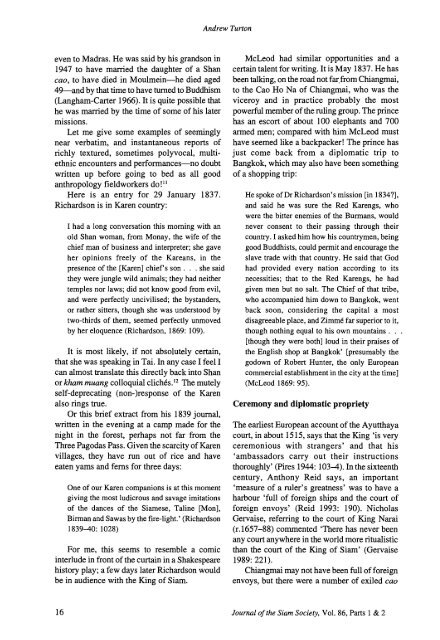The Journal of the Siam Society Vol. LXXXVI, Part 1-2 ... - Khamkoo
The Journal of the Siam Society Vol. LXXXVI, Part 1-2 ... - Khamkoo
The Journal of the Siam Society Vol. LXXXVI, Part 1-2 ... - Khamkoo
Create successful ePaper yourself
Turn your PDF publications into a flip-book with our unique Google optimized e-Paper software.
Andrew Turton<br />
even to Madras. He was said by his grandson in<br />
1947 to have married <strong>the</strong> daughter <strong>of</strong> a Shan<br />
cao, to have died in Moulmein-he died aged<br />
49-and by that time to have turned to Buddhism<br />
(Langham-Carter 1966). It is quite possible that<br />
he was married by <strong>the</strong> time <strong>of</strong> some <strong>of</strong> his later<br />
missions.<br />
Let me give some examples <strong>of</strong> seemingly<br />
near verbatim, and instantaneous reports <strong>of</strong><br />
richly textured, sometimes polyvocal, multiethnic<br />
encounters and performances-no doubt<br />
written up before going to bed as all good<br />
anthropology fieldworkers do! 11<br />
Here is an entry for 29 January 1837.<br />
Richardson is in Karen country:<br />
I had a long conversation this morning with an<br />
old Shan woman, from Monay, <strong>the</strong> wife <strong>of</strong> <strong>the</strong><br />
chief man <strong>of</strong> business and interpreter; she gave<br />
her opinions freely <strong>of</strong> <strong>the</strong> Kareans, in <strong>the</strong><br />
presence <strong>of</strong> <strong>the</strong> [Karen] chiefs son ... she said<br />
<strong>the</strong>y were jungle wild animals; <strong>the</strong>y had nei<strong>the</strong>r<br />
temples nor laws; did not know good from evil,<br />
and were perfectly uncivilised; <strong>the</strong> bystanders,<br />
or ra<strong>the</strong>r sitters, though she was understood by<br />
two-thirds <strong>of</strong> <strong>the</strong>m, seemed perfectly unmoved<br />
by her eloquence (Richardson, 1869: 109).<br />
It is most likely, if not absolutely certain,<br />
that she was speaking in Tai. In any case I feel I<br />
can almost translate this directly back into Shan<br />
or kham muang colloquial cliches. 12 <strong>The</strong> mutely<br />
self-deprecating (non-)response <strong>of</strong> <strong>the</strong> Karen<br />
also rings true.<br />
Or this brief extract from his 1839 journal,<br />
written in <strong>the</strong> evening at a camp made for <strong>the</strong><br />
night in <strong>the</strong> forest, perhaps not far from <strong>the</strong><br />
Three Pagodas Pass. Given <strong>the</strong> scarcity <strong>of</strong> Karen<br />
villages, <strong>the</strong>y have run out <strong>of</strong> rice and have<br />
eaten yams and ferns for three days:<br />
One <strong>of</strong> our Karen companions is at this moment<br />
giving <strong>the</strong> most ludicrous and savage imitations<br />
<strong>of</strong> <strong>the</strong> dances <strong>of</strong> <strong>the</strong> <strong>Siam</strong>ese, Taline [Mon],<br />
Birman and Sawas by <strong>the</strong> ftre-light.' (Richardson<br />
1839-40: 1028)<br />
For me, this seems to resemble a comic<br />
interlude in front <strong>of</strong> <strong>the</strong> curtain in a Shakespeare<br />
history play; a few days later Richardson would<br />
be in audience with <strong>the</strong> King <strong>of</strong> <strong>Siam</strong>.<br />
McLeod had similar opportunities and a<br />
certain talent for writing. It is May 1837. He has<br />
been talking, on <strong>the</strong> road not far, from Chiangmai,<br />
to <strong>the</strong> Cao Ho Na <strong>of</strong> Chiangmai, who was <strong>the</strong><br />
viceroy and in practice probably <strong>the</strong> most<br />
powerful member <strong>of</strong> <strong>the</strong> ruling group. <strong>The</strong> prince<br />
has an escort <strong>of</strong> about 100 elephants and 700<br />
armed men; compared with him McLeod must<br />
have seemed like a backpacker! <strong>The</strong> prince has<br />
just come back from a diplomatic trip to<br />
Bangkok, which may also have been something<br />
<strong>of</strong> a shopping trip:<br />
He spoke <strong>of</strong> Dr Richardson's mission [in 1834?],<br />
and said he was sure <strong>the</strong> Red Karengs, who<br />
were <strong>the</strong> bitter enemies <strong>of</strong> <strong>the</strong> Burmans, would<br />
never consent to <strong>the</strong>ir passing through <strong>the</strong>ir<br />
country. I asked him how his countrymen, being<br />
good Buddhists, could permit and encourage <strong>the</strong><br />
slave trade with that country. He said that God<br />
had provided every nation according to its<br />
necessities; that to <strong>the</strong> Red Karengs, he had<br />
given men but no salt. <strong>The</strong> Chief <strong>of</strong> that tribe,<br />
who accompanied him down to Bangkok, went<br />
back soon, considering <strong>the</strong> capital a most<br />
disagreeable place, and Zimme far superior to it,<br />
though nothing equal to his own mountains . . .<br />
[though <strong>the</strong>y were both] loud in <strong>the</strong>ir praises <strong>of</strong><br />
<strong>the</strong> English shop at Bangkok' [presumably <strong>the</strong><br />
godown <strong>of</strong> Robert Hunter, <strong>the</strong> only European<br />
commercial establishment in <strong>the</strong> city at <strong>the</strong> time]<br />
(McLeod 1869: 95).<br />
Ceremony and diplomatic propriety<br />
<strong>The</strong> earliest European account <strong>of</strong> <strong>the</strong> Ayutthaya<br />
court, in about 1515, says that <strong>the</strong> King 'is very<br />
ceremonious with strangers' and that his<br />
'ambassadors carry out <strong>the</strong>ir instructions<br />
thoroughly' (Pires 1944: 103-4). In <strong>the</strong> sixteenth<br />
century, Anthony Reid says, an important<br />
'measure <strong>of</strong> a ruler's greatness' was to have a<br />
harbour 'full <strong>of</strong> foreign ships and <strong>the</strong> court <strong>of</strong><br />
foreign envoys' (Reid 1993: 190). Nicholas<br />
Gervaise, referring to <strong>the</strong> court <strong>of</strong> King Narai<br />
(r.1657-88) commented '<strong>The</strong>re has never been<br />
any court anywhere in <strong>the</strong> world more ritualistic<br />
than <strong>the</strong> court <strong>of</strong> <strong>the</strong> King <strong>of</strong> <strong>Siam</strong>' (Gervaise<br />
1989: 221).<br />
Chiangmai may not have been full <strong>of</strong> foreign<br />
envoys, but <strong>the</strong>re were a number <strong>of</strong> exiled cao<br />
16<br />
<strong>Journal</strong> <strong>of</strong> <strong>the</strong> <strong>Siam</strong> <strong>Society</strong>, <strong>Vol</strong>. 86, <strong>Part</strong>s 1 & 2

















